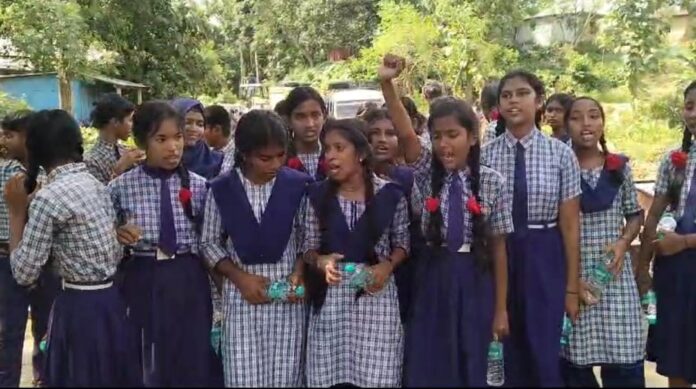Students from various schools in North Kalamchoura, Tripura, took to the streets on September 10, 2024, to demand the transfer of teachers to their understaffed institutions. The students blocked a major road in the area, causing severe disruptions to traffic, and were joined by concerned parents and local residents in a protest against the shortage of teachers in local schools. The demonstration quickly garnered attention, highlighting ongoing grievances in the state’s education system, particularly in rural areas where staffing shortages have plagued schools for years.
The protest began in the morning as hundreds of students, carrying placards and chanting slogans, gathered at a key junction in North Kalamchoura. The students are demanding immediate action from the education department to transfer more teachers to their schools, many of which have been struggling to function with inadequate staff. Some schools reportedly do not have subject-specific teachers for crucial subjects such as science and mathematics, which has severely hampered the quality of education being provided.
For months, students and their families have expressed frustration over the lack of response from the authorities. They claim that repeated appeals for more teachers have gone unanswered, leaving students to fall behind in their studies. The situation is particularly dire in rural schools, where staff shortages have become a chronic issue. Several schools are operating with only a handful of teachers, forcing students to rely on inadequate lessons, or in some cases, self-study. This has created a sense of educational inequality between urban and rural areas, with rural students feeling left behind.
Parents of the protesting students voiced their concerns, stating that the future of their children is being jeopardized by the absence of qualified teachers. Many parents argued that despite government promises to improve rural education, little has been done to address the issue of teacher shortages. Some even pointed out that teachers who are assigned to rural schools are often transferred to urban areas within a short period, leaving rural schools severely understaffed.
The road blockade caused major disruptions to daily life in North Kalamchoura, with vehicles stuck in long queues and local businesses affected by the reduced footfall. Commuters, though inconvenienced, largely expressed support for the students’ cause, acknowledging that the issue of poor education quality in rural areas needs immediate attention. “We understand the students’ frustration. Education is a basic right, and if they are being denied that, something needs to change,” said one local shopkeeper who was impacted by the road closure.
As the protest continued throughout the day, local authorities attempted to negotiate with the students and their supporters. Representatives from the education department promised to look into the matter, but the protesters remained adamant that they would not back down until concrete steps were taken to address the issue. Many of the students expressed their determination to continue the protest, stating that they had no choice but to take to the streets after being ignored for so long.
The lack of teachers in rural schools is not a new issue in Tripura. For years, rural areas have struggled to attract and retain qualified educators, leading to a wide gap in educational standards between urban and rural regions. This disparity has long been a source of contention, with parents and local leaders urging the government to prioritize rural education. Despite various government schemes aimed at improving rural education, the problem of teacher shortages persists, with many teachers seeking transfers to more developed areas with better facilities.
The protest in North Kalamchoura is part of a broader wave of discontent across Tripura, as similar demonstrations have been held in other rural areas. Students and parents are increasingly vocal about the need for an overhaul of the education system, arguing that without qualified teachers, students are being denied their right to a proper education. The protest has also raised concerns about the future of education in Tripura, with many fearing that without immediate intervention, the state’s rural students will continue to suffer from inadequate academic support.
As the day progressed, the situation in North Kalamchoura remained tense but peaceful. Authorities are under pressure to respond quickly, with the protesters showing no signs of backing down. The education department has assured that it will address the issue of teacher transfers, but many in the community remain skeptical, pointing to years of unfulfilled promises. The students, parents, and supporters of the protest have made it clear that they will not stop until tangible changes are made, demanding that their voices be heard and their educational needs met.
The protest in North Kalamchoura is a stark reminder of the challenges faced by rural students in Tripura and other parts of India. While urban areas benefit from better resources and staffing, rural schools are often left to cope with shortages that directly impact students’ futures. As the protest continues, the state government faces increasing pressure to find a solution that addresses the concerns of the students and ensures that every child, regardless of where they live, receives a quality education.


